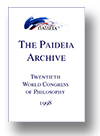|
21.
|
The Paideia Archive: Twentieth World Congress of Philosophy:
Volume >
16
Dieter Wandschneider
Autonomy in Determinism
abstract |
view |
rights & permissions
| cited by
There are good reasons for determinism — the option for pure freedom of will proves to be a non-tenable position. However, this collides with the everyday experience of autonomy. The following argument will attempt to show that determinism and autonomy are compatible. (1) A first consideration going back to MacKay makes clear that I myself cannot foresee in principle my own determination; hence fatalism has lost its grounds. (2) From the perspective of physical determination, I show that quantum-physical indetermination is not at all in a position to explain autonomy, while from the perspective of systems theory physical determination and autonomy is well-compatible. (3) The possibility of knowledge denotes a further increase of such autonomy. From this perspective, acting is something like designing-oneself or choice-of-oneself. (4) Consciousness of not being fixed in principle now becomes a determining condition of my acting, which appears to be determined by autonomy. This explains the ineradicable conviction that freedom of will is essential for human beings. (5) I conclude that the autonomy of acting is greater the more that rational self-determination takes the place of stupid arbitrariness.
|
|
|
22.
|
The Paideia Archive: Twentieth World Congress of Philosophy:
Volume >
16
Joseph Waterman
The Life, Work and Death of Self-Consciousness in Hegel’s Master-Slave Dialectic
abstract |
view |
rights & permissions
| cited by
As presented in the Phenomenology of Spirit, the aim of Life is to free itself from confinement "in-itself" and to become "for-itself." Not only does Hegel place this unfolding of Life at the very beginning of the dialectical development of self-consciousness, but he characterizes self-consciousness itself as a form of Life and points to the advancement of self-consciousness in the Master/Slave dialectic as the development of Life becoming "for-itself." This paper seeks to delineate this often overlooked thread of dialectical insight as it unfolds in the Master/Slave dialectic. Hegel articulates a vision of the place of human self-consciousness in the process of Life as a whole and throws light on the role of death as an essential ingredient in the epic drama of life's struggle and Spirit's birth.
|
|
|
23.
|
The Paideia Archive: Twentieth World Congress of Philosophy:
Volume >
16
Dennis M. Weiss
Human Nature and the Digital Culture:
The Case for Philosophical Anthropology
abstract |
view |
rights & permissions
| cited by
Within contemporary Western philosophy, the issues of human nature and our place in the cosmos have largely been ignored. In the resulting vacuum, the various subcultures that have grown up around the digital computer (the so-called "digital culture") have been actively defining and shaping popular conceptions of what it means to be human and the place of humanity in the digital era. Here one finds an implicit view of human nature that includes recurrent themes such as: an emphasis on mind as information independent of the physical body, the obsolescence of the human body, the elimination of human particularity, the malleability of human nature, and the logic and orderliness of the computer as a metaphor for the cosmos. This view of human nature shares important characteristics with Cartesian and Christian views of human nature long rejected by philosophers. A renewal of the philosophical anthropology movement — devoted to the issues of human nature and humanity's place in the cosmos — permits us to see the inadequacy of the conception of human nature implicit in the digital culture.
|
|




